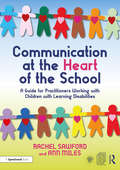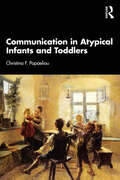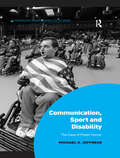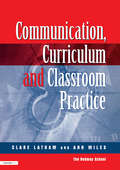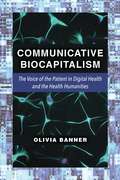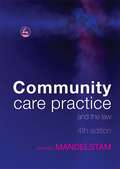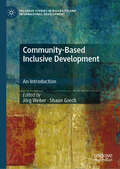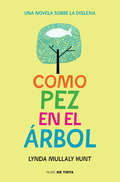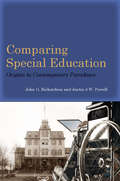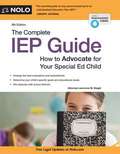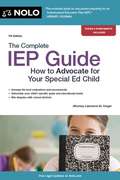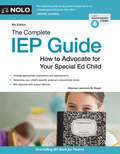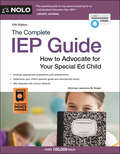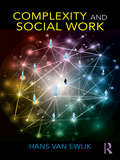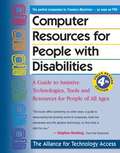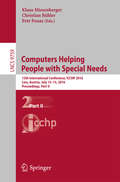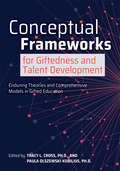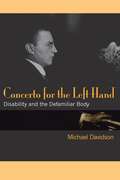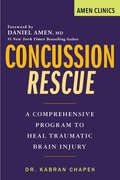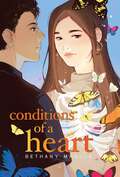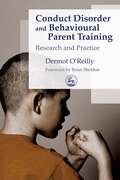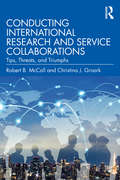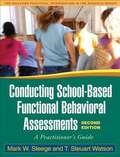- Table View
- List View
Communication at the Heart of the School: A Guide for Practitioners Working with Children with Learning Disabilities
by Ann Miles Rachel SawfordCommunication at the Heart of the School introduces a simple, practical approach for communication development in schools, with a specific focus on children with Severe Learning Difficulties (SLD) or Profound and Multiple Learning Difficulties (PMLD). The tried-and-tested framework offers a shared approach to communication development between teachers and speech and language therapists, moving through three crucial stages: the communication assessment, the communication pathway and the classroom environment. It provides a clear structure for the role of each professional and explains how they contribute to every aspect of the child’s communication development. Key features include: A communication pathway that follows a yearly cycle of assessment, plan and intervention, identifying specific communication needs and offering advice on creating communication-friendly environments A focus on the shared vision of teachers and speech and language therapists, creating a united and team-led approach to communication development, ensuring that both therapists and teachers feel supported in tackling complex communication challenges effectively Photocopiable and downloadable assessment forms for accurately measuring outcomes in a time-friendly and accessible way Underpinned by the Communication and Cognitive Framework currently used by teachers, speech and language therapists and families, this resource offers a complete package of communication support. It is an essential tool for speech and language therapists and teachers supporting children communicating at early developmental levels.
Communication in Atypical Infants and Toddlers
by Christina F. PapaeliouThis book presents a comparative review of the latest studies and data on prelinguistic communication and early semantic development in autism spectrum disorder (ASD), Williams syndrome (WMS), attention-deficit/hyperactivity disorder (ADHD), and early language delay. Papaeliou offers a critical analysis of the literature, compares key theoretical approaches, and interprets data on development in atypical populations.A fruitful synthesis of theory and research reveals that, instead of cognitive deficits, the core feature of these neurodevelopmental disorders consists of deficits in the ability for self- and intersubjective coordination, which adversely affects early interactions and, consequently, the emergence of language. The book composes fragmentary proposals on the role of rhythm disruptions in different conditions, setting out the idea that disruption in interactional synchrony is a connecting thread through neurodevelopmental disorders which show high prevalence or high comorbidity rates. Papaeliou identifies distinct communicative patterns characteristic of each disorder and puts forward a unifying theory for interpreting data on early communication and language development in atypical populations.This is ideal reading for psychologists, psycholinguists, psychiatrists, paediatricians, speech therapists, and special educators. Students in developmental psychology and anyone interested in understanding the research behind typical and atypical development will also benefit from this text.
Communication, Sport and Disability: The Case of Power Soccer (Interdisciplinary Disability Studies)
by Michael S. JeffressSports are ubiquitous in American society, and given their prominence in the culture, it is easy to understand how most youth in the United States face pressure to participate in organized sports. But what does this mean for the hundreds of thousands of Americans who live with one or more physical disabilities and, in particular, those in powered wheelchairs? Located at the intersection of sports and disability, this book tells the story of power soccer - the first competitive team sport specifically designed for electric wheelchair users. Beginning in France in the 1970s, today, over sixty teams compete within the United States Power Soccer Association (USPSA) and the sport is actively played in over thirty countries. Using ethnographic research conducted while attending practices, games, and social functions of teams from across the nation, Jeffress builds a strong case that electric wheelchair users deserve more opportunity to play sports. They deserve it because they need the same physical and psychosocial benefits from participation as their peers, who have full use of their arms and legs. It challenges the social constructions and barriers that currently stand in the way. Most importantly, this book tells the story of some amazing power soccer athletes. It is a moving, first-hand account of what power soccer means to them and the implications this has for society.
Communications,Curriculum and Classroom Practice
by Ann Miles Clare LathanThis book discusses the development of English (Communication and Literacy) for children below level one of the National Curriculum. The authors take account of the latest QCA guidelines for pupils with significantly below age-related expectations.
Communicative Biocapitalism: The Voice of the Patient in Digital Health and the Health Humanities
by Olivia BannerThe Precision Medicine Initiative, Apple’s HealthKit, the FitBit—the booming digital health industry asserts that digital networks, tools, and the scientific endeavors they support will usher in a new era of medicine centered around “the voice of the patient.” But whose “voices” do such tools actually solicit? And through what perspective will those voices be heard? Digital health tools are marketed as neutral devices made to help users take responsibility for their health. Yet digital technologies are not neutral; they are developed from an existing set of assumptions about their potential users and contexts for use, and they reflect dominant ideologies of health, dis/ability, gender, and race. Using patient-networking websites, the Quantified Self, and online breast cancer narratives, Communicative Biocapitalism examines the cultural, technological, economic, and rhetorical logics that shape the “voice of the patient” in digital health to identify how cultural understandings and social locations of race, gender, and disability intertwine with whose voices are elicited and how they are interpreted.
Community Care Practice and the Law: Fourth Edition
by Michael MandelstamThis fourth edition of Community Care Practice and the Law has been fully updated to reflect the rapid and continuing legal, policy and practice changes affecting community care. It provides comprehensive and jargon-free explanations of community care legislation, as well as other areas of law directly relevant to practitioners, including the NHS, disabled facilities grants and housing adaptations, asylum and immigration, mental capacity, human rights, disability discrimination, health and safety at work and negligence - and a range of legal provisions relevant to the protection and safeguarding of adults. Apart from the burgeoning legal case law and ombudsman investigations, changes from the last edition include coverage of the Mental Capacity Act 2005, legal implications of 'self directed care' and 'individual budgets', changes to direct payments and 'ordinary residence' determinations. In particular, new guidance applies to the high profile issue of NHS continuing health care. The book is an essential guide for practitioners and managers in both the statutory and voluntary sectors, policy makers in local authorities and the NHS, advocates, lawyers and social work students.
Community-Based Inclusive Development: An Introduction (Palgrave Studies in Disability and International Development)
by Shaun Grech Jörg WeberThis edited book responds to the theoretical vacuum on Community Based Inclusive Development (CBID) and accommodates the learning needs of students, researchers and practitioners looking to understand the conceptual underpinnings and practice dimensions of CBID, while developing new theoretical ground on CBID. Bringing together established and emerging scholars and practitioners, this edited volume seeks to: · Offer a theoretical, critical and interdisciplinary introduction for students, academics and practitioners working in CBID in the Global South. · Build new theory and knowledge that can inform research and practice. · Explore in-depth a range of issues through a critical lens and connect these with CBID. · Contribute evidence-based material for CBID programming and advocacy and inform the work of mainstream community development practitioners.
Como pez en el árbol: Una novela sobre la dislexia
by Lynda Mullaly HuntUna historia emotiva e inspiradora que llegará a todos aquellos que alguna vez han sentido que no encajaban. «Todos somos genios. Pero si juzgas a un pez por su habilidad paratrepar a los árboles, pasará toda su vida sintiéndose un estúpido.»Albert Einstein, disléxico Ally es una maestra en el arte del engaño. Cada vez que llega a un nuevo colegio, esconde su incapacidad de leer creando inteligentes pero extrañas distracciones a su alrededor. Tiene miedo de pedir ayuda. Y, además, ¿es que alguien puede curar la estupidez? Pero su nuevo profesor ha visto el brillo y la creatividad oculta tras su aire problemático. Con su ayuda, Ally aprenderá que la dislexia no es algo de lo que avergonzarse, mientras se abre ante ella un mundo lleno de posibilidades. Porque cada uno de nosotros llevamos un océano dentro, y las grandes mentes no suelen pensar como lo hacen los demás. La crítica ha dicho...«Conmovedora... Con el énfasis en "pensar de forma diferente". Los fans de R.J. Palacio apreciarán esta historia que ensalza el valor de la amistad y de la inteligencia no convencionales.»Kirkus Reviews «Una historia llena de personajes únicos dibujados con el corazón. Una novela sobre la dislexia, algo tan único como su heroína.»Booklist «Los lectores... adorarán a esta maravillosa protagonista.»The Horn Book
Comparing Special Education
by John G. Richardson Justin J. W. PowellIn today's schools the number of students who receive additional resources to access the curriculum is growing rapidly, and the ongoing expansion of special education is among the most significant worldwide educational developments of the past century. Yet even among developed democracies the range of access varies hugely, from one student in twenty to one student in three. In contemporary conflicts about educational standards and accountability, special education plays a key role as it draws the boundaries between exclusion and inclusion. Comparing Special Educationunites in-depth comparative and historical studies with analyses of global trends, with a particular focus on special and inclusive education in the United States, England, France, and Germany. The authors examine the causes and consequences of various institutional and organizational developments, illustrate differences in forms of educational governance and social policy priorities, and highlight the evolution of social logics from segregation of students with special educational needs to their inclusion in local schools.
Competency Based Curriculum for Teachers of the Visually Handicapped
by Susan J. SpunginThis book is a guideline for teachers of the blind. Six basic types of education system now exist, and were examined for the purposes of this study: full-time special class, resource room, itinerant program, resource room/itinerant program, teacher consultant, and residential school.
Complete IEP Guide, The
by Lawrence M. SiegelCreate an IEP with this start to finish guide for caring parents. Your special needs child needs a special education, and as a parent, you face a number of obstacles as you work with your school district to develop an Individual Education Plan (IEP). Lots of steps, complicated paperwork, and intimidating procedures may seem like too much to take on... ...but you can do it! Let The Complete IEP Guide guide you through this complex process with vital information, strategies, and the encouragement you need to secure your child's education. Get everything you need to: understand your child's rights untangle eligibility rules and assessments collect all school records draft goals and objectives pinpoint specific problems develop a blueprint of program and services research school programs and alternatives prepare for IEP meetings resolve disputes with your school district Whether you're new to the IEP process or entering it once again, this user friendly, plain English guide is your outline for an effective educational experience for your child. You'll get all the forms, sample letters, and resources that you could possibly need at any stage of the IEP process. This edition is completely updated to reflect the latest and major changes to federal regulations concerning your special education student, including details about your child's eligibility for special education services.
Complete IEP Guide, The
by Lawrence Siegel AttorneyCreate an IEP with this start-to-finish guide for caring parents Your special needs child needs a special education, and as a parent, you face a number of obstacles as you work with your school district to develop an Individual Education Plan (IEP) - lots of steps, complicated paperwork, and intimidating procedures may seem like too much to take on... ...but you can do it! Let The Complete IEP Guide guide you through this complex process with vital information, strategies, and the encouragement you need to secure your child's education. Get everything you need to: understand your child's rights untangle eligibility rules and assessments collect all school records draft goals and objectives pinpoint specific problems develop a blueprint of program and services research school programs and alternative prepare for IEP meetings resolve disputes with your school district Whether you're new to the IEP process or entering it once again, this user-friendly, plain English guide is your outline for an effective educational experience for your child. You'll get all the forms, sample letters, and resources that you could possibly need at any stage of the IEP process. The 7th edition is completely updated to reflect the latest -- and major -- changes to federal regulations concerning your special education student, including details about your child's eligibility for special education services.
Complete IEP Guide, The: How to Advocate for Your Special Ed Child
by Lawrence M. SiegelPut the law on your child's side Federal law guarantees every child a free, appropriate education, and the goal of the Individualized Education Program (IEP) is to assure that every child with special needs receives what the law promises. But if you have a special ed child, you know that your family must make sure the school follows through. This powerful book covers: eligibility rules and assessments working with outside experts developing your child's ideal educational program preparing for and attending IEP meetings develop a blueprint of program and services, and resolving disputes with school districts. Whether you're new to the IEP process or entering it once again, this user-friendly, plain English guide is your outline for an effective educational experience for your child. This edition of The Complete IEP Guide provides key forms, sample letters and resources you need at every stage of the IEP process. With it, you can make sure your child gets a good education—the education he or she deserves.
Complete IEP Guide, The: How to Advocate for Your Special Ed Child
by Lawrence M. SiegelRecipient of the 2017 BRONZE Winner for Education Award from Foreword Indies. Get the educational services and support your child deserves Federal law guarantees every child a free appropriate education, and the goal of the Individualized Education Program (IEP) is to assure that every child with special needs receives what the law promises. But if you have a special ed child, you know that your family must make sure the school follows through. This powerful book covers: eligibility rules and assessments working with outside experts developing your child's ideal educational program preparing for and attending IEP meetings, and resolving disputes with school districts. The 10th edition includes summaries of important court decisions, expanded information on independent evaluations and bullying, and additional real-life tips. It provides key forms, sample letters, and resources you need at every stage of the IEP process. With it, you can make sure your child gets a good education—the education he or she deserves. With downloadable forms, letters and resources inside. Includes IEP blueprint.
Complexity and Social Work
by Hans Van EwijkBeing socially competent is essential in late modern society. We expect people to find their own accommodation, partner, job, community and lifestyle and struggle to find answers for those who are not able or do not have the opportunity to achieve these things. By placing social complexity, social vulnerability and social efficacy within a framework of social policy and social practice, Complexity and Social Work argues that growing social complexity excludes more and more citizens from social participation. The book starts with exploring complexity, super-diversity, vulnerability and social efficacy. From there the book deals with the discourses of social policy, social work and social work research, pledging for social policy aiming at desired outcomes, for generic contextual social work, and for a research practice that recognises practical wisdom. Aimed at final year undergraduates, postgraduates, professionals, trainers and lecturers involved in social work, social policy, social care, mental health and allied fields who are committed to treating socially vulnerable people with respect and acceptance, this book, the first of its kind, offers new perspectives on social complexity for practice, theory and research in human services.
Composing Myself: A Journey through Post-Partum Depression
by Fiona ShawFollowing the birth of her second child the author was hospitalized for two months with a severe postpartum depression. She was treated with electroshock therapy which left her with large gaps in her short-term memory. In an effort to make sense of what had happened to her she set out to write about her own life. She further launched an exploration of the literature about post-partum depression, and interviewed other women who had experienced this frightening and little-understood illness.
Computer Resources for People with Disabilities
by Alliance for Technology AccessA resource for people with disabilities who want to improve their lives through the use of technology.
Computers Helping People with Special Needs: 15th International Conference, ICCHP 2016, Linz, Austria, July 13-15, 2016, Proceedings, Part II (Lecture Notes in Computer Science #9759)
by Klaus Miesenberger Christian Bühler Petr PenazThe introduction to the 1st International Conference on Computers for Han- cappedPersons(Vienna,1989)byAMinTjoa(UniversityofVienna)andRoland Wagner(UniversityofLinz)?nishedwiththefollowingmissionstatementonthe "Future Direction on Computers for Handicapped Persons": "The di'erent themes show that a lot of problems are solved by the usage of computer technology for helping handicapped persons, for instance for the blind and visually handicapped. A consequence of the discussed themes there are two directions which should be done in the next years. One direction is obvious. The tools must be improved and research and development work should be extended to all groups of handicapped (even if they are numerically not so large as for instancetheblindorvisuallyhandicappedpersons). Ontheothersideinthearea of social implications there is an increasing demand on social science studies on overall computer use among disabled persons. Because sources are in principle missing today about disabled persons work tasks, research in this ?eld must begin by trying to survey this aspect. Particular attention should be paid to the extent and character of computer use among the handicapped in work life. There are a lot of questions, which should be answered during the next years for reaching the aim of rehabilitation. " Fifteen years later the 9th International Conference on Computers Helping People with Special Needs (Paris, 2004) o'ered a comprehensive and deepened view on general awareness,special research and individual applications conce- ing disabled people and their participation in our society.
Conceptual Frameworks for Giftedness and Talent Development: Enduring Theories and Comprehensive Models in Gifted Education
by Paula Olszewski-Kubilius Tracy CrossConceptual Frameworks for Giftedness and Talent Development explores current and enduring theories and comprehensive models of giftedness and talent development. Each chapter:Includes a description of a different model, theory, or framework.Shares the most important implications of each model, including underrepresentation and social justice issues.Provides commentary on how each model compares to others.Includes discussion questions for use with students and professionals.The editors also consider common issues across conceptual frameworks, such as the degree to which achievement defines giftedness, the goal of gifted education, and the role of psychosocial factors. This is a comprehensive reference for scholars and practitioners in the field, as well as those studying at the graduate level.
Concerto for the Left Hand: Disability and the Defamiliar Body
by Michael DavidsonConcerto for the Left Hand is at the cutting edge of the expanding field of disability studies, offering a wide range of essays that investigate the impact of disability across various art forms---including literature, performance, photography, and film. Rather than simply focusing on the ways in which disabled persons are portrayed, Michael Davidson explores how the experience of disability shapes the work of artists and why disability serves as a vital lens through which to interpret modern culture. Covering an eclectic range of topics---from the phantom missing limb in film noir to the poetry of American Sign Language---this collection delivers a unique and engaging assessment of the interplay between disability and aesthetics. Written in a fluid, accessible style, Concerto for the Left Hand will appeal to both specialists and general audiences. With its interdisciplinary approach, this book should appeal not only to scholars of disability studies but to all those working in minority art, deaf studies, visual culture, and modernism. Michael Davidson is Professor of American Literature at the University of California, San Diego. His other books include Guys Like Us: Citing Masculinity in Cold War Poetics and Ghostlier Demarcations: Modern Poetry and the Material World.
Concussion Rescue: A Comprehensive Program to Heal Traumatic Brain Injury (Amen Clinic Library)
by Kabran ChapekDaniel Amen and The Amen Clinics have become widely known and respected across America and internationally via television, print, and the online world reaching millions of viewers and consumers each year. We now have the wonderful opportunity to publish a line of health care books under the Amen Clinics imprimatur.#1 New York Times bestselling author, Daniel Amen, will write a foreword for each book and promote the book through all of his channels (mailing list, newsletter, social media). The first book we will be publishing is Concussion Rescue, which will give readers the natural and effective protocols for healing from traumatic brain injury.In Concussion Rescue, Dr. Kabran Chapek shares the programs and protocols that he uses at the Amen Clinics to put patients on the pathway to healing from traumatic brain injury. From general assessment using sophisticated tools (SPECT imaging, MRIs and CAT scans) to very specific blood tests (out-of-balance lab values in blood can point to symptoms of brain injury and may explain why the brain is not healing), Dr. Chapek guides readers to getting the proper medical care. He shares the cutting edge and most effective treatments for acute traumatic brain injury, as well as chronic traumatic brain injury, and provides the most powerful natural treatments including diet and supplements. Concussion Rescue will be an invaluable and potentially lifesaving resource for athletes, parents of student athletes, coaches, and anyone who suffers a mild or severe brain injury.
Conditions of a Heart
by Bethany MangleFor fans of Talia Hibbert and Lynn Painter comes a funny and unflinchingly honest story about a teen who must come to terms with her disability and what it means for her identity, her love life, and her future.Brynn Kwan is desperate for her high school persona to be real. That Brynn is head of the yearbook committee, the favorite for prom queen, and definitely not crumbling from a secret disability that&’s rapidly wearing her down. If no one knows the truth about her condition, Brynn doesn&’t have to worry about the pitying looks or accusations of being a faker that already destroyed her childhood friendships. She&’s even willing to let go of her four-year relationship with her first love, Oliver, rather than reveal that a necessary surgery was the reason she ignored his existence for the entire summer. But after Brynn tries to break up a fight at a pep rally and winds up barred from all her clubs and senior prom, she has nothing left to prop up her illusion of being just like everyone else. During a week-long suspension from school, she realizes that she doesn&’t quite recognize the face in the mirror—and it&’s not because of her black eye from the fight. With a healthy sister who simply doesn&’t understand and a confused ex-boyfriend who won&’t just take a hint and go away like a normal human being, Brynn begins to wonder if it&’s possible to reinvent her world by being the person she thought no one wanted: herself.
Conduct Disorder and Behavioural Parent Training: Research and Practice
by Dermot OreillyProgress made with children with conduct disorder in specialist schools often does not transfer to the home, but this book shows how behavioural parent training and applied behaviour analysis can help professionals work with parents to continue improving their child's behaviour. Conduct Disorder and Behavioural Parent Training provides a comprehensive introduction to the field of conduct disorder and the individual, familial and social factors that influence the development of persistent antisocial behaviour. The author presents thorough evidence for the effectiveness of the following aspects of behavioural parent training: * compliance training * encouraging good behaviour through praise, enthusiasm and attention * using `time out' as an effective punishment technique * transfer of improvements to school setting * effects of treatment on the child's siblings. He considers the relative impact and costs of different settings for parent training, and outlines ethical issues and future directions for research in this area. This book is essential reading for all professionals involved in the care of children with conduct disorder, as well as psychology and social work students and academics.
Conducting International Research and Service Collaborations: Tips, Threats, and Triumphs
by Robert B. McCall Christina J. GroarkConducting International Research and Service Collaborations: Tips, Threats, and Triumphs provides academic researchers, as well as non-profit and private professionals, with much-needed guidance on how to plan, implement, and manage international research and intervention projects. Accessibly written and illustrated throughout with examples and case studies of projects from Robert B. McCall and Christina J. Groark's wide-ranging and decades-long experience of cross-border collaborations, this book outlines how to prepare for and ensure success of cross-border research projects and interventions, how to embrace unique circumstances you may encounter, and what to do if things go wrong. Each chapter covers a general domain of concerns, advice, and lessons learned in conducting international collaborative projects followed by concrete illustrations that pertain to them. Key topics covered include launching projects and working with stakeholders, travelling and living abroad, cultural considerations, planning and funding, administrative issues, dealing with crises, and successfully implementing and disseminating findings effectively. This comprehensive guide is ideal for researchers and project managers – from large, global organizations to small NGOs, human services, private industry, and other fields embarking on such projects, as well as university students and academics.
Conducting School-Based Functional Behavioral Assessments, Second Edition
by T. Steuart Watson Mark SteegeExplaining the "whats," "whys," and "how-tos" of functional behavioral assessment, this practical and engaging book is packed with real-world tools and examples. Effective procedures are presented for evaluating challenging behavior in K 12 students, organizing assessment data, and using the results to craft individualized behavior support plans. The authors draw on extensive school-based experience to provide sample reports, decision trees, and reproducible checklists and forms all in a large-size format with lay-flat binding to facilitate photocopying. New to This Edition Revised throughout to reflect significant advances in the field. Provides an updated conceptual model for understanding behavior. Three new chapters cover brief functional analysis, behavior-analytic problem solving, and direct behavioral consultation. Fully updated coverage of legal issues under IDEIA. Includes revised forms and sample reports.
